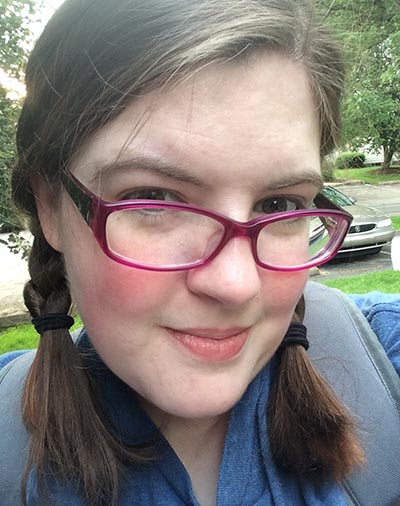What Does it Mean to be an Adult on the Spectrum?
Lydia Wayman
Posted on
August 31, 2015
In 1990, I was three years old. I ate ten things, I screamed about socks and tags, and I panicked at the door on my toy barn—it said “moo” as it opened. I couldn’t be bribed to play with other kids at school; my preschool teachers tried. I had been recognizing words for a year by then, and I was reading chapter books at four years. My parents raised their concerns with my doctor and teachers, and they were told I was unmotivated and disorganized, smart enough to know better, and stubborn for refusing food. Today, a child like me rings a bell for teachers and parents. But there was no bell to ring… no diagnosis existed yet for a child like me.
It took 21 years and over a dozen labels that fit me like my uncle’s old suit to get to the right one. My new and only friend noticed the social, communication, and sensory issues. The tests and scales agreed with her, and the mystery was finally solved. The timing of my diagnosis created a unique situation—I will only ever know autism in adulthood, and my experience of adulthood is inextricably tied to autism. I can’t find meaning in one without the other.
At the time of diagnosis, I was like a runaway wagon piled high, heading towards impending disaster. I often felt frustrated, overwhelmed, and misunderstood. Autism diagnosis was like a first pair of glasses, a lens that made my life much clearer. Who knew my extreme sensitivities had a common denominator—sensory issues! The most salient revelation was that there are other people like me, who communicate emotions and experiences best through typing! Reading their books and blogs, I learned not to be ashamed about what I couldn’t say—instead, I’m proud to use my written voice, because I’ve worked hard for it.
I started my blog to challenge stereotypes about autism. I share my experiences as they help me understand or explain an idea. Writing allows me to process the things I’m too overloaded to understand in the moment. It was a surprise to others that I can be very aware and intuitive, I just need time and a keyboard to show it. My blog brought opportunities for writing, editing, and speaking at local and national events. I’ve gained friends who walk a similar path and mentors who have sparked incredible change. In fact, they are the same authors of the books and blogs that were helpful early in my journey, and although I’m still learning from them, now I’m also presenting with them! While I still need more support than most at my age, my work emphasizes my strengths, and others respect me. They may not always understand why someone can ace her grad program but not cross the street on her own… but that’s okay! I can grab my iPad and tell them.
Since autism is a different experience for each person, being an autistic adult can mean a lot of things. We face at least one common challenge as we transition, though, and it’s not about gaining the right skills or total independence… It’s taking ownership of the idea that we are capable when the right supports and accommodations are in place. People don’t always believe we have the potential to learn something, and other times, they don’t believe we really need support. Whether we do or don’t, that’s ours to decide. Sometimes, I find the most crucial words are the hardest to come by when I need them, like asking for a break or not to be touched. But all the other words build on these as a foundation: "I need help, please" and "Thanks, but I can do it myself." Getting them right in the moment still takes practice, but those simple statements assert autonomy across countless situations.
As an autistic child, I only ate ten things, I screamed at loud noises, and I never said that I was angry or scared. Today, I bring my own food, I stay home from fireworks, and I use a keyboard when I have something important to say. I’m the same person I’ve always been, but with the right supports and focus on lifelong progress, I’m a happy, passionate, autistic adult.
 Lydia Wayman, M.A., is an autistic advocate with a B.S. in elementary education and M.A. in English and nonfiction writing. She blogs at Autism Speaks and contributes to other websites, magazines, and anthologies. Lydia manages the digital media for a local autism nonprofit and enjoys presenting at local and national events and serving as a Young Leader with the Autistic Global Initiative.
Lydia Wayman, M.A., is an autistic advocate with a B.S. in elementary education and M.A. in English and nonfiction writing. She blogs at Autism Speaks and contributes to other websites, magazines, and anthologies. Lydia manages the digital media for a local autism nonprofit and enjoys presenting at local and national events and serving as a Young Leader with the Autistic Global Initiative.
The views expressed in this blog are the author's own and not necessarily those of the Life Course Outcomes Research Program.